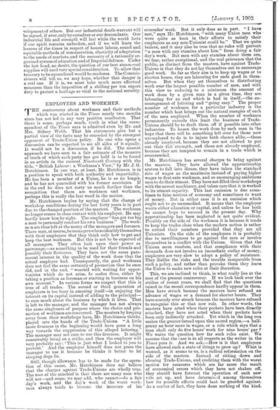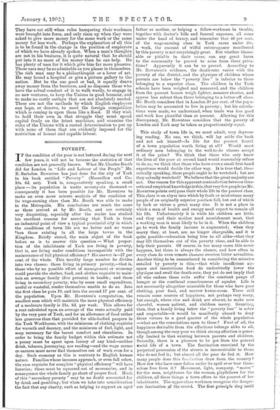EMPLOYERS AND WORKMEN. T HE controversy about workmen and their methods
which was started in the Times nearly two months since has not led to any very positive conclusion. That there is some, perhaps much, truth in what the corre- spondent of the Times says is admitted even by Mr. and Mrs. Sidney Webb. That his statements give but a partial view of the facts may be conceded by the strongest opponent of Trade-Union policy. No one who opens a discussion can be expected to see all sides of it equally. It would not be a discussion if he did. The nearest approach we have seen to a fair estimate of the measure of truth of which each party has got hold is to be found in an article in the current Nineteenth Century with the title, " British Labour : a Workman's View," by Mr. J. G. Hutchinson. In one way, at least, Mr. Hutchinson is in a position to speak with both authority and impartiality. He has been a member of a Union, he is so no longer, and he has not quarrelled with his former associates. If in the end he does not carry us much further than the recognition that there are workmen and workmen, perhaps this is really the last word in the matter.
Mr. Hutchinson begins by saying that the change of workshop conditions during the last forty years is in part due to the changed position of the masters. The workman no longer comes in close contact with his employer. He may hardly know him by sight. The employer " has got too big a man to personally conduct his own business." The work- men are thus left at the mercy of the managers and foremen. There may, of course, be managers who so identify themselves with their employers that they think only how to get and keep the best workmen. But this is not to be expected of all managers. They often look upon their power as patronage,—as something to be used for their friends and possibly their flatterers. They have not the same para- mount interest in the quality of the work done that the actual employer had. Consequently, the good workman does not feel the same certainty of promotion that he once did, and in the end, " wearied with waiting for oppor- tunities which do not arise, he makes them, either by taking a position as foreman or starting in business on his own account." In various forms we suspect that this is true of all trades. The second or third generation of employers is too busy in amusing itself—in enjoying the interest on its capital instead of adding to the principal— to care much about the business by which it lives. That is left to the manager, and the manager has not always the same singleness of purpose where the choice and pro- motion of workmen are concerned. The masters by keeping away from their workshops have, Mr. Hutchinson thinks, played into the hands of the Trade-Unions. " A little more firmness in the beginning would have gone a long way towards the suppression of this alleged loitering." The manager may not care to use this firmness. It might conceivably bring on a strike, and then the employer will very probably say : This is just what I looked to you to prevent. And the employer himself does not press the manager to use it because he thinks it better to let sleeping dogs lie.
Still, though allowance has to be made for the opera- tion of this cause, Mr. Hutchinson does not believe that the charges against Trade-Unions are wholly true. The root of the mischief is that there are many men who will not—and some, we may add, who cannot—do a fair day's work, and the day's work of..the worst work- man always tends to become the Measure of Isis comrades' work. But it only does so in part. " I have met," says Mr. Hutchinson, "with many Union men who were quite as keen in their efforts to satisfy their employers as any non-Unionist could be." That we quite believe, and it may also be true that no rules will prevent "a man with any stamina about him" from doing a fair day's work. But men with any stamina about them are, we fear, rather exceptional, and the real grievance that the public, as distinct from the masters, have against Trade- Unions is that they do not lay themselves out to encourage good work. ' So far as their aim is to keep up wages or to shorten hours, they are labouring for ends good in them- selves. But when they set themselves to distributing work over the largest possible number of men, and • with this view to reducing to a minimum the amount of work done by a given man in a given time, they are labouring for an end which is bad in itself,—the en- couragement of loitering and "going easy." The proper number of workmen for a particular industry is the number which best brings out the natural energies of each of the men employed. When the number of workmen permanently exceeds this limit the business of Trade- Unions should be to draft them off if possible into other industries. To lessen the work done by each man in the hope that there will be something left over for those now unemployed to do is to injure both classes alike,—those already employed, because they are not allowed to put out their full strength, and those not already employed, because they are tempted to remain in a trade which is overcrowded.
Mr. Hutchinson has several charges to bring against the masters. They have allowed the apprenticeship system to fall into disuse, they have taken the standard rate of wages as the maximum instead of paying higher wages to first-rate workmen, and so encouraging ambitious men to do their utmost. They have not filled their workshops with the newest machinery, and taken care that it is worked. to its utmost capacity. This last omission is due some- times to false notions of economy and sometimes to want of money. But in either case it is an omission which ought not to go unremedied. It means that the employer wants either education or capital, and unless ho has both he cannot hope to succeed in the present day. Why apprenticeship has been neglected is not quite evident. Possibly on the side of the workmen it is because it tends to keep the trades close when the modern notion is rather to extend their numbers provided that they are all Unionists. On the side of the employers it ie probably due to unwillingness to go against the men or involve themselves in a conflict with the Unions. Given that the Unions seem resolute, and that compliance with their demands does not involve an immediate outlay of money, employers are very slow to adopt a policy of resistance. They dislike the risks and the trouble inseparable from such a policy, and rather than provoke them they leave the Union to make new rules at their discretion.
This, we are inclined to think, is what really lies at the root of the present controversy. If we look back over the strikes of recent years, we shall find that the questions raised in the recent correspondence hardly appear in them. Men have struck because the masters have refused an advance of wages or a demand for shorter hours. They have scarcely ever struck because the masters have refused to recognise this or that new rule. In other words, the masters have acted when their pockets have been directly attacked, they have not acted when their pockets have been only indirectly attacked. Yet which in the long run makes the greater inroad upon this sacred region,—a half- penny an hour more in wages, or a rule which says that a man shall only do five hours' work for nine hours' pay ? We waive the question how far such rules exist. We assume that the case is in all respects as the writer in the Times puts it. And we ask,—How is it that employers have allowed such a state of things to grow up ? What is wanted, as it seems to us, is a radical reformation on the side of the masters. Instead of sitting down and abusing Trade-Unions, and crediting them with the worst motive for measures which are far more the result of economical errors which they have not shaken off, they should have forecast the operation of each new rule set up, and have determined among themselves bow its possible effects could best be guarded against. As a matter of fact, they have done nothing of the kind. They have sat still when rules hampering their workmen were brought into force, and only risen up when they were asked to give more money for the same work or the same money for less work. Perhaps the explanation of all this is to be found in the change in the position of employers of which we have already spoken. When a man's thoughts axe not in his business, it is quite natural that he should put into it no more of his money than he can help. He has plenty of uses for it which' ive him far more pleasure. Those uses may be as admirable as you please in themselves. The rich man may be a philanthropist or a lover of art. He may found a hospital or give a picture gallery to the nation. But be the use good or bad, it equally draws away money from the business, and so disposes those who have the actual conduct of it to walk warily, to engage in no new ventures, to keep the Unions in good humour, and to make no costly outlays that are not absolutely needed. These are not the methods by which English employers can hope, or deserve, to meet the foreign competition which is coming in upon them like a flood. If they wish to hold their own in that struggle they must spend capital freely on the latest machines, and examine the rules of the Unions with a rooted determination to put up with none of them that are evidently imposed for the restriction of honest and capable labour.







































 Previous page
Previous page